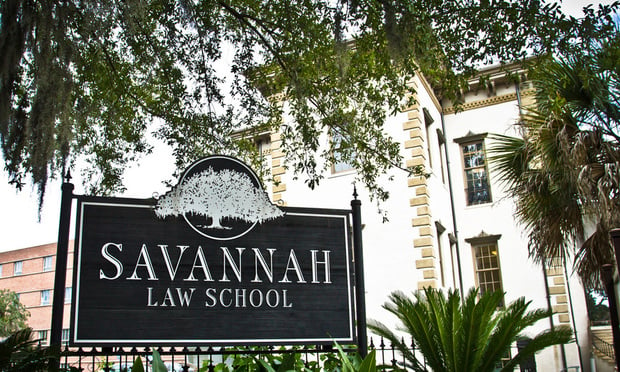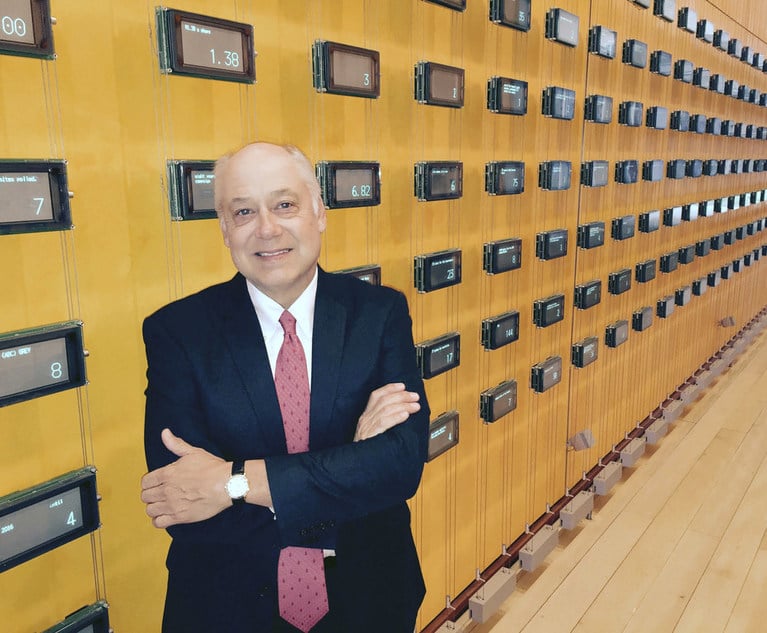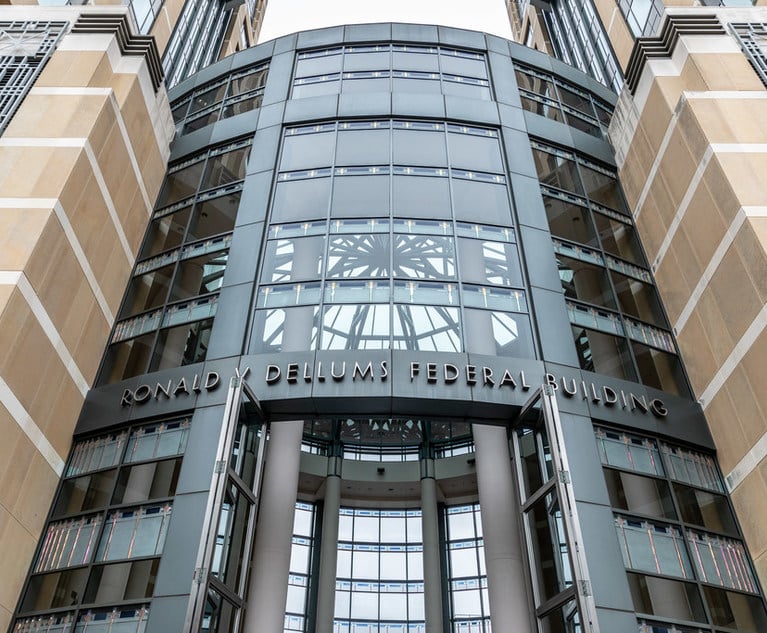Savannah Law School Closure Yields Student Class Action
"Earlier today, we filed a class action lawsuit on behalf of the students at Savannah Law School and are actively seeking justice on their behalf,” Stephen Lowry of Harris Lowry Manton said. “We hope to help these students secure an adequate recovery in light of this devastating turn of events."
March 26, 2018 at 02:27 PM
3 minute read
The original version of this story was published on Daily Report
 Savannah Law School (Photo: Wikimedia)
Savannah Law School (Photo: Wikimedia)
Within days of Savannah Law School announcing its closing last Wednesday, students filed a putative class action for breach of contract and negligence, seeking relief including attorney fees and punitive damages.
“Earlier today, we filed a class action lawsuit on behalf of the students at Savannah Law School and are actively seeking justice on their behalf,” Stephen Lowry of Harris Lowry Manton said in a Friday evening news release. The plaintiffs firm has offices in Savannah and Atlanta.
The school's administrators told students Wednesday that they would be closing at the end of the spring 2018 semester. They said the school's building had been sold, and students would finish the semester at an undisclosed location, according to the lawsuit and local news reports.
Savannah Law School operates as a branch of Atlanta's John Marshall Law School. Administrators told students they would be offered a one-time $2,000 scholarship to transfer to Atlanta.
“These students attended Savannah Law School in good faith, with the expectation that they could complete a law degree in Savannah from an accredited institution,” Lowry said. “We hope to help these students secure an adequate recovery in light of this devastating turn of events.”
Savannah Law School Dean Malcolm Morris could not be reached immediately for comment on the class action, and didn't provide comment to The Daily Report when first asked about the closure. The school did release a statement last Thursday citing an “unforeseen national decline” in legal jobs and the law school applicant pool. “The Board's decision was prompted by the continued small student enrollment at the branch. As such, it was the Board's responsibility to acknowledge that a viable program of legal education could not be sustained at that location,” the school's statement said.
The complaint, filed in Chatham County State Court, named both Savannah Law School and John Marshall Law School as defendants. It accuses them of “false and misleading representations and omissions” about financial stability, the grading curve and noncompliance with American Bar Association accreditation standards, as well as denying students the opportunity to take a full course of legal studies and obtain a J.D. where they started.
John Marshall is one of 10 law schools nationwide that the ABA has sanctioned for violating admissions standards.
The students also alleged that their grades were devalued. “Following the announcement of the closure, students were notified that any who sought to transfer their credits to another school would receive a letter informing that school that the school used a deflated grading curve—that is, that its grades are curved to a 2.7 rather than a customary 2.9 or 3.0,” the complaint said.
The students also took issue with the sale of the law school's nearly 200-year-old building on Drayton Street, the former Candler Hospital. “At least one legal news site has reported 'speculat[ion] that Savannah Law was opened in the first place [by Atlanta's John Marshall] with the goal of using federal student loans as income to wait out the market before flipping on a prime piece of real estate,'” the complaint said.
Full-time students at the private, for-profit law school paid approximately $21,100 per semester, the complaint said. Part-time students paid $12,660 per semester.
This content has been archived. It is available through our partners, LexisNexis® and Bloomberg Law.
To view this content, please continue to their sites.
Not a Lexis Subscriber?
Subscribe Now
Not a Bloomberg Law Subscriber?
Subscribe Now
NOT FOR REPRINT
© 2025 ALM Global, LLC, All Rights Reserved. Request academic re-use from www.copyright.com. All other uses, submit a request to [email protected]. For more information visit Asset & Logo Licensing.
You Might Like
View All
‘Extremely Disturbing’: AI Firms Face Class Action by ‘Taskers’ Exposed to Traumatic Content
5 minute read
Class Action Settlements Totaled $40B+ Three Years in a Row: 'We’re in a New Era'
5 minute read
Miami Judge Approves Shaq's $11 Million Settlement to Resolve Astrals Investor Claims
3 minute read
Crypto Exchange’s ‘Meteoric Rise’ Leads to Nationwide Class Action Trend
4 minute readTrending Stories
- 1'A Death Sentence for TikTok'?: Litigators and Experts Weigh Impact of Potential Ban on Creators and Data Privacy
- 2Bribery Case Against Former Lt. Gov. Brian Benjamin Is Dropped
- 3‘Extremely Disturbing’: AI Firms Face Class Action by ‘Taskers’ Exposed to Traumatic Content
- 4State Appeals Court Revives BraunHagey Lawsuit Alleging $4.2M Unlawful Wire to China
- 5Invoking Trump, AG Bonta Reminds Lawyers of Duties to Noncitizens in Plea Dealing
Who Got The Work
J. Brugh Lower of Gibbons has entered an appearance for industrial equipment supplier Devco Corporation in a pending trademark infringement lawsuit. The suit, accusing the defendant of selling knock-off Graco products, was filed Dec. 18 in New Jersey District Court by Rivkin Radler on behalf of Graco Inc. and Graco Minnesota. The case, assigned to U.S. District Judge Zahid N. Quraishi, is 3:24-cv-11294, Graco Inc. et al v. Devco Corporation.
Who Got The Work
Rebecca Maller-Stein and Kent A. Yalowitz of Arnold & Porter Kaye Scholer have entered their appearances for Hanaco Venture Capital and its executives, Lior Prosor and David Frankel, in a pending securities lawsuit. The action, filed on Dec. 24 in New York Southern District Court by Zell, Aron & Co. on behalf of Goldeneye Advisors, accuses the defendants of negligently and fraudulently managing the plaintiff's $1 million investment. The case, assigned to U.S. District Judge Vernon S. Broderick, is 1:24-cv-09918, Goldeneye Advisors, LLC v. Hanaco Venture Capital, Ltd. et al.
Who Got The Work
Attorneys from A&O Shearman has stepped in as defense counsel for Toronto-Dominion Bank and other defendants in a pending securities class action. The suit, filed Dec. 11 in New York Southern District Court by Bleichmar Fonti & Auld, accuses the defendants of concealing the bank's 'pervasive' deficiencies in regards to its compliance with the Bank Secrecy Act and the quality of its anti-money laundering controls. The case, assigned to U.S. District Judge Arun Subramanian, is 1:24-cv-09445, Gonzalez v. The Toronto-Dominion Bank et al.
Who Got The Work
Crown Castle International, a Pennsylvania company providing shared communications infrastructure, has turned to Luke D. Wolf of Gordon Rees Scully Mansukhani to fend off a pending breach-of-contract lawsuit. The court action, filed Nov. 25 in Michigan Eastern District Court by Hooper Hathaway PC on behalf of The Town Residences LLC, accuses Crown Castle of failing to transfer approximately $30,000 in utility payments from T-Mobile in breach of a roof-top lease and assignment agreement. The case, assigned to U.S. District Judge Susan K. Declercq, is 2:24-cv-13131, The Town Residences LLC v. T-Mobile US, Inc. et al.
Who Got The Work
Wilfred P. Coronato and Daniel M. Schwartz of McCarter & English have stepped in as defense counsel to Electrolux Home Products Inc. in a pending product liability lawsuit. The court action, filed Nov. 26 in New York Eastern District Court by Poulos Lopiccolo PC and Nagel Rice LLP on behalf of David Stern, alleges that the defendant's refrigerators’ drawers and shelving repeatedly break and fall apart within months after purchase. The case, assigned to U.S. District Judge Joan M. Azrack, is 2:24-cv-08204, Stern v. Electrolux Home Products, Inc.
Featured Firms
Law Offices of Gary Martin Hays & Associates, P.C.
(470) 294-1674
Law Offices of Mark E. Salomone
(857) 444-6468
Smith & Hassler
(713) 739-1250








